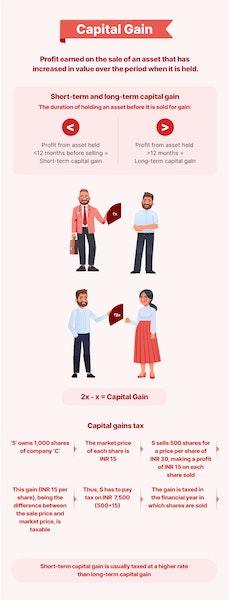Capital gain is an increase in the value of an asset, which when it is sold by the owner, creates income. The asset could be tangible, such as a house, car, building site, or intangible, such as shares, bonds, or other securities.
Capital gain can be short-term (less than a year) or long-term (more than a year). Capital gains are usually taxed as income tax. The difference between the actual sale price and the cost of acquisition of the asset is taxed as capital gain. Long-term capital gain is taxed at a lower rate than short-term capital gains usually.
On the other hand, if the holder of an asset makes a loss when the asset is sold, the loss can be carried forward to the following financial years, and set off against any gain that occurs in future.

